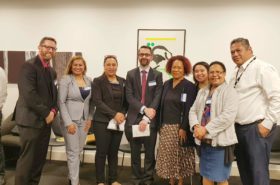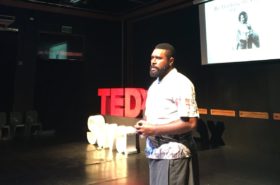Violence against women is used as a tool by some men to maintain gender inequalities, disrupt female freedom, manifest control over a woman’s behaviour and; in some cultures, show who is “boss”.
 AusAID reports that women in the Pacific suffer the most violence in the world, with a staggering 60% of females dealing with domestic violence issues. A survey of Pacific Islanders from various communities show that the violence epidemic is not slowing down any time soon.
AusAID reports that women in the Pacific suffer the most violence in the world, with a staggering 60% of females dealing with domestic violence issues. A survey of Pacific Islanders from various communities show that the violence epidemic is not slowing down any time soon.
The report provided by AusAID indicate that the Pacific region require a joint effort by its governing bodies, non-governmental organisations (NGO), non-profit organisations (NPO) and a change of the individual’s mindset to bring an end to the cycle of physical, sexual and emotional abuse.
This blog will explore why some men commit violence against women, what the current statistics are and possible solutions to end this epidemic; specifically in the Pacific Islands.
Why Some Men Commit Violence Against Women
According to UNICEF, the various forms of violence experienced by women in the Pacific are:
 1. Intimate Partner Abuse: including physical, emotional, sexual and financial abuse; destruction/theft of property; and forced pregnancy.
1. Intimate Partner Abuse: including physical, emotional, sexual and financial abuse; destruction/theft of property; and forced pregnancy.
2. Sexual violence: opportunistic rape; punishment or “payback rape”; sexual abuse of girls and incest; gang rape; abduction for rape; conflict-related rape; and sexual exploitation of women and girls by husbands, brothers, fathers.
3. Other forms of violence: arranged marriage; forced marriage as part of a dispute settlement; mistreatment of widows; sorcery accusations; violence against sex workers; violence by women against women, particularly in disputes over men.
President Unga Folau Tupou of the ‘The Leniata Legacy’ shares that the causes of violence against women range from:

- A lack of education;
- A combination of traditional and cultural practises;
- Non-exposure to outside communities; and
- Having a “frog in the well” mentality, which means that people can be too narrow-minded to believe that there maybe a bigger picture than what one sees and thinks.
Furthermore, the ‘Partners for Prevention’ organisation reports that some men commit violence against women due to the combination of complex factors, not pertaining to one specific reason such as alcohol abuse for example.
The organisation’s studies reveal the following reasons as to why men perpetuate violence against women:
- A low level of education;

- Have personally experienced violence,
emotional abuse or neglect as children; - Belief in the social norm that violence shows one’s masculinity and dominance over women in their society; and
- Have witnessed violence during their childhood against their mother, which is the most common factor.
Domestic Violence Statistics in the Pacific Islands
In discovering solutions to end violence against women, we must first grasp how gruesome the current situation is.
Below is a compilation of data which reflect the nature and extent of violence in a few key island nations, provided by Unga Folau Tupou with reports derived from AusAID and the United Nations.
- In Fiji, 66% of women are physically abused by partners; 26% beaten while pregnant:

- In PNG, 67% are physically abused by partners:

- In the PNG Highlands, 100% of women are beaten by their spouses with gang-rape and pay-back rape a common occurrence:

- In Tonga, 33% of women experience violence; 17% are sexually assaulted and 24% emotionally abused:

- 46% of women in Samoa are physically abused; up to 8% are beaten unconscious by their spouse:

- Half of the women surveyed in Tuvalu lost their virginity through forced sex:

- In Kiribati, 68% of women are physically or sexually assaulted:

Solutions to Stopping Violence Against Women
A man who abuses a woman physically, sexually or emotionally perceives that he has power over that individual. When this is “normalised” in a culture where silence reigns supreme and shame is placed back on the victim; whilst the perpetrator is protected, the cycle of abuse most certainly continues.
I have witnessed this disparity within my own Fijian culture and as such, have vowed to expose these men who believe they can get away with abusing women when they should have protected them.
Studies by Partners for Prevention suggest the following recommendations in arresting this epidemic:
- Change social norms related to the acceptability of violence and the subordination of women;
- Promote non-violence masculinities oriented towards equality and respect;
- Address child abuse and promote healthy families and nurturing, violence-free environments for children;
- Work with young boys to address early ages of sexual violence perpetration;
- Promote healthy sexuality for men and address male sexual entitlement;
- End impunity for men who rape; and
- Develop interventions that respond to the specific patterns of violence in each context.
SUMMARY

In a social context, ending violence against women begins with a change in an individual’s mindset; where boys and men develop an attitude that respects and values girls and women.
This mindset is then confirmed in the family setting, which is free of violence and encompasses healthy nurturing; where children witness their mothers or female figure-heads being respected and valued.
Additionally, a violence-free home can be strengthened by the support of community, which condemns and voices its stand against violence.
Finally, ending violence is then reinforced by society when it puts in place severe legal consequences and strict judicial punishment for men who violate women.
It is incredibly sad and frightening that AusAID and UN Reports indicate that 60% of Pacific Islander women suffer violence.
I believe that in time, with the combination of passionate individuals breaking the silence of this epidemic by exposing perpetrators of abuse with the support of non-governmental, non-profit organisations and government-led initiatives, this epidemic will surely come to an end.
If you are experiencing or know someone who is suffering from any type of abuse, I encourage you to speak up, report the matter to the police and expose the perpertrator so that others can be protected. You can call the helpline in your community, for Australia it is 1800RESPECT (1800 737 737).




